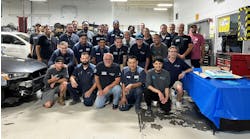Wheel balancing weights containing lead appear to be well on their way toward becoming a pollution issue of the past as initiatives are being pushed to ease them out of tire centers and off the nation’s roadways. California’s Center for Environmental Health (CEH) reached a legal agreement with Chrysler and three large weight producers, requiring the companies to end the use of leaded wheel weights in the state by the end of 2009. The landmark agreement marks the first-ever legally binding statewide rule phasing out lead in wheel weights in the U.S., and will end the annual release of 500,000 pounds of lead into the environment in California, which occurs when wheel weights break off of automobile wheels. Last year the CEH launched legal action against Chrysler, Perfect Equipment, Inc.; Hennessey Industries; and Plombco, Inc., citing a threat to California’s drinking water due to lead weights falling from cars and trucks. “Wheel weights have been identified as the largest new route of lead releases into the environment,” says Michael Green, CEH’s executive director. “By moving the industry away from leaded wheel weights, we are helping to keep the lead out of our kids’ drinking water.” According to the U.S. Geological Survey (USGS), about 65,000 tons of lead wheel weights are in use on cars and trucks throughout the nation, and it is estimated that at least 3 percent of them end up falling off of the wheels to which they’re attached. The USGS maintains that wayward wheel weights “drop to the road surface where they become abraded by vehicle traffic, eventually becoming dissipated into the environment by wind and storm water.” A scientific peer-reviewed study in 2000 found that lead pollution from wheel weights “is continuous, significant, and widespread, and is potentially a major source of human lead exposure.” The research notes that the highest rate of lead deposition likely occurs in urban areas, posing a significant lead poisoning threat to poor and minority populations that are already disproportionately impacted by other sources of lead. While Chrysler had lagged behind most car makers in switching to non-leaded wheel weights for their new cars, the auto maker is now quickly phasing out the use of lead as a result of the CEH action, says Green, lamenting that too many tire centers are still using them: That situation should cease to be a problem in California as the supply from vendors dwindles under the phase-out agreement. “This settlement represents the beginning of the end for lead wheel balancing weights in the U.S.,” declares Jeff Gearhart, research director at the Ecology Center in Michigan. “We fully expect dozens of states to follow California’s leadership and ban the use of lead wheel weights."
In 2005, the Ecology Center petitioned the U.S. Environmental Protection Agency (EPA) under the Toxic Substance Control Act (TSCA), calling for a federal ban on lead wheel weights. They have been banned in the European Union since July of 2005, and Japan and Korea are currently phasing them out. Gearhart is unhappy that the EPA “has refused to enact a ban, instead relying on voluntary industry action.” He says “it is simply scandalous that three years after the rest of the world banned toxic lead weights, the U.S. continues to allow their use. It’s time fix our failed regulatory system.” Aggressive legislation is being floated as a necessary remedy to sink lead’s presence. Washington, Maine and Massachusetts have considered such laws, but the CEH settlement creates the first binding statewide ban on shipments from major weight suppliers. Some municipalities have eliminated lead weights on their local fleets, and the U.S. Air Force and Postal Service have taken action to eliminate lead weights from their motor pools. Under the California agreement, Plombco will end sales of leaded weights in the state by the end of this year; Hennessey and Perfect Equipment agreed to cease shipments by the end of 2009. Chrysler is to immediately stop using leaded weights on 55 percent of its vehicles and to fully eliminate lead-containing weights on cars intended for sale in California by July 31, 2009. Perfect says it has the most comprehensive line of lead-free wheel weights in the industry. Plombco is the first North American producer to offer lead-free wheel weights to Original Equipment Manufacturers and to the aftermarket. BADA, a division of Hennessy, earlier this summer launched an Internet site, www.steelwheelweights.com, aimed at promoting the environmental benefits of its line of steel wheel weights. “The majority of wheel weights are made are still made of lead, but that is quickly changing,” says Don Vanderheyden, Hennessy group marketing manager. The site is designed to “educate independent dealers and retailers, merchandisers and aftermarket companies about the full line of non-lead products BADA now offers and the technical and environmental benefits associated with our steel wheel weights.” He reports that the company took a proactive stride in 2005 when the firm developed several wheel weight styles in steel before regulations started demanded the change. A complete line of them is now available because the steel weights have been so well-received, Vanderheyden adds. “Several leading automakers and tire retailers have made the decision to transition from lead wheel weights,” he points out. In late 2007, Bridgestone Firestone announced plans to do away with lead weights; its nearly 2,000 automotive service store locations are switching to steel weights, replacing millions of the lead variety that are annually applied by Firestone Complete Auto Care, Tires Plus, ExpertTire and Wheel Works. In June Firestone Racing began using a non-lead product, the 3M Wheel Weight System, for all Indy Racing League IndyCar Series and Firestone Indy Lights events. Executives from the company recently appeared with EPA officials to help launch the agency’s voluntary National Lead-Free Wheel Weight Initiative. “By taking part in the National Lead-Free Wheel Weight Initiative, EPA’s partners are helping protect public health and the environment by phasing out the sale and installation of lead wheel weights and educating the public about the benefits of alternatives,” explains Susan Parker Bodine, assistant administrator for the EPA’s Office of Solid Waste and Emergency Response. “When it comes to being ecologically sensitive, we’re all in this together,” says Al Speyer, executive director of Bridgestone Firestone Motorsports. “By eliminating the use of lead wheel weights on the race track and on our neighborhood highways and byways, we’re taking a small action that will have a big effect.” For more information, visit www.epa.gov, www.ecocenter.org and www.leadfreewheels.org. |


